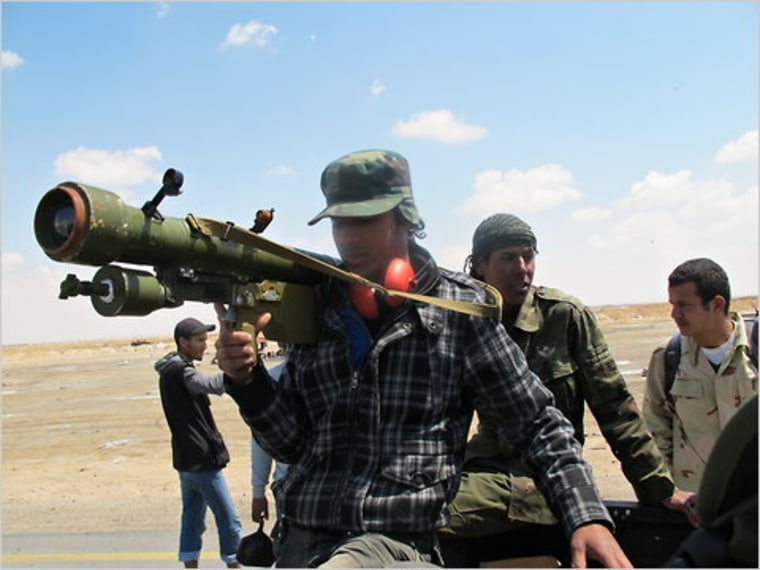Geoff Porter knows Libya. He's the head of North Africa Risk Consulting, "a political risk firm." Translation: Porter explains North Africa to clients with a serious need to understand what's happening there. This morning, he sends over a note about the death of Moammar Khaddafy, including the prospects for the rebel forces now known as the National Transitional Council, or NTC.
It's a little technical, and totally worth it. I'll excerpt one part here and then put the whole note after the jump. Porter writes:
Clearly, Qadhafi's death will have a positive impact on Libya's security environment. Following the collapse of Bani Walid earlier this month, the taking of Sirte means that no significant pro-Qadhafi bastions remain. This will allow the NTC to declare an end to the conflict and allow it to dedicate more time and resources to the flailing political process. Nevertheless there will still be some dead-enders and residual fighting taking place in and around Sirte and potentially elsewhere in the south. Qadhafi's demise also does not alter the fact that Libya is simply swimming in weapons – RPGs, assault rifles, anti-aircraft, SAMs, landmines, SEMTEX, even SCUDs. For the moment, these weapons are not likely to be the source of destabilizing violence, but political tensions are running high in the country and the ready availability of weapons is disconcerting and places a question mark over long term security and stability. The only thing that can be said with certainty at this juncture is that Libya is going to be one big arms bazaar for the foreseeable future.
More on where Libya got all those arms here, and on what the U.S. is doing about it.
Photo above: C.J. Chivers/NYT's At War blog. Full note from Porter, after the jump.
Security: Clearly, Qadhafi's death will have a positive impact on Libya's security environment. Following the collapse of Bani Walid earlier this month, the taking of Sirte means that no significant pro-Qadhafi bastions remain. This will allow the NTC to declare an end to the conflict and allow it to dedicate more time and resources to the flailing political process. Nevertheless there will still be some dead-enders and residual fighting taking place in and around Sirte and potentially elsewhere in the south. Qadhafi's demise also does not alter the fact that Libya is simply swimming in weapons – RPGs, assault rifles, anti-aircraft, SAMs, landmines, SEMTEX, even SCUDs. For the moment, these weapons are not likely to be the source of destabilizing violence, but political tensions are running high in the country and the ready availability of weapons is disconcerting and places a question mark over long term security and stability. The only thing that can be said with certainty at this juncture is that Libya is going to be one big arms bazaar for the foreseeable future.
Politics: Qadhafi had long ceased to be a political factor in the country and his persistence was largely a security issue. His death, therefore, does not dramatically alter Libya's political predicament. The problems that the NTC faced in forming a new transitional government remain. These problems include the degree to which Islamists led by Abdelhakim Belhadj should be included in the new government, the role of former regime members in any future government, and the regional distribution of portfolios. The NTC will obviously try to extract as much political capital as possible from Qadhafi's death – and the likely capture of his sons Muatassim Billah and Saif al-Islam – but the political bounce will be transitory. In fact, Qadhafi's death will expose more clearly the political challenges the NTC Chairman Mustafa Abdel Jalil is facing. If it could be said that the NTC was on the brink of failure yesterday, that is only slightly less true today. This raises the question of how the NTC will proceed. It is likely that the NTC will announce portfolios and the appointment of new ministers in a piecemeal fashion – addressing portfolios that concern the international community the most (oil, finance, foreign affairs), while postponing the trickier ones related to domestic issues.
Oil: A key concern for foreign investors and commodity markets is what Qadhafi's death means for Libyan oil. His death is likely to be one of those events where the perception is enough to put slight downward pressure on oil prices after a slight uptick earlier today, even though it has no bearing on Libya's actual ability to increase its export capacity. Over the medium term, his death means that there are now absolutely no doubts that the NATO bombing campaign will officially expire in November. This should allow IOCs to move key personnel back into the country, and into the upstream in particular, to properly determine the extent of the damage to the upstream (both above ground and below). In addition, the end of fighting in Libya will allow oil services companies to more quickly address damage to Libyan oil infrastructure and export terminals. Although Libya is currently producing slightly upwards of 400,000bpd, there are severe export constraints, with only one onshore terminal functioning (Marsa el-Hariga) and Total exporting from its offshore platform. Although the actual requirements to repair other export terminals are still unknown, the formal end of the conflict due to Qadhafi's demise will bring some clarity around these issues and IOCs and markets are likely to respond positively.
